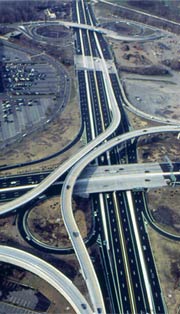U.S. Department of Transportation
Federal Highway Administration
1200 New Jersey Avenue, SE
Washington, DC 20590
202-366-4000
Federal Highway Administration Research and Technology
Coordinating, Developing, and Delivering Highway Transportation Innovations
 |
| This report is an archived publication and may contain dated technical, contact, and link information |
|
FHWA Home > Pubs > Research > Infrastructures > Structures > Long-Term Bridge Performance Program |
Long-Term Bridge Performance Program |

|
 |
Thursday, January 14, 2010
Marriot, Thurgood Marshall North
8 a.m.–12 noon
Come learn about the Federal Highway Administration’s (FHWA’s) flagship bridge initiative from the experts engaged in the project. The half-day session will feature team presentations and audience participation.
This workshop presents an update on the program goals, priorities, main features and current status. The ongoing pilot phase of the program will be described with information on the regimen of visual inspection, nondestructive testing, sampling (such as deck cores), instrumentation, modeling, load testing and monitoring. The findings and conclusions of the pilot study will help direct future program activities. The long-term data collection phase and the process of selecting LTBP bridges will also be presented.
[Download agenda for session details (HTML) (PDF)]
The FHWA LTBP program continues to move forward in advancing knowledge of bridge performance. The pilot study phase of the program got underway by conducting detailed field investigation of the first pilot bridge located on U.S. Route 15 over I-66 in Haymarket, Virginia, in late September 2009. A number of automated, digital, breakthrough technologies were used to conduct comprehensive detection and assessment of deterioration of the deck and to evaluate potential for corrosive environment and active corrosion by noninvasive means. These technologies employ ultrasonic, electromagnetic radar waves, sound and surface waves, and infrared imaging to probe interior microstructure and characterize subsurface conditions. Data collected through these technologies are in digital format, which can be processed and restored into images that are amenable to computational tools for accurate analysis.
In addition to the bridge in Virginia, detailed inspections of three additional pilot bridges in the States that are participating in the pilot program—New Jersey, Utah, and California—were recently completed. The plan is to perform detailed inspection of the three remaining pilot bridges identified in Florida, New York, and Minnesota by August 2010.
The 7 pilot bridges are intended to provide a fair representation of various types of structures and climates, and to keep the sample size manageable and practical so the team can focus on refining its testing and implementation protocols and methods. The bridges will be subjected to various inspections, testings, and monitorings for the next 2 years. The pilot program is designed to validate and refine the methods, protocols, and guidelines developed in the first phase of the program for gathering reliable information, and to ensure consistency in the data that will be collected in the long-term phase of the program. The latter phase will include detailed evaluation and monitoring of a representative sample of the Nation’s bridges. These bridges will represent many structural types and materials and a variety of conditions, exposures, and locations.
The LTBP team joined hundreds of bridge owners and engineers, senior policymakers, U.S. Government officials, bridge designers, construction executives, and suppliers from throughout the United States and abroad at the 2009 International Bridge Conference (IBC), held June 14-17 in Pittsburgh, Pennsylvania.
The 3-day conference at the David L. Lawrence Convention Center featured exhibits and seminars on topics including bridge evaluation, construction, context-sensitive design, long-span bridges, bridge monitoring, bridge rehabilitation, bridge management, and accelerated bridge construction. A featured seminar, the FHWA Long-Term Bridge Performance Program, presented the scope of the program activities to members of the bridge community.
Guest speaker, Craig Beissel of the Pennsylvania Department of Transportation—featured agency of the 26th annual conference—spoke about the challenges that Pennsylvania faces. With nearly 6,000 bridges in Pennsylvania classified as “structurally deficient,” Beissel explained that risk assessment and inspection, as explained by the LTBP team, would be vital to restoring and building sustainable bridges.
A discussion session allowed attendees to ask questions about the program and provide input on the program’s progress to date.
The TRB conducted a Web briefing, “Defining and Measuring Bridge Performance,” on Thursday, June 18, 2009 to address the efforts and challenges faced by highway transportation community to measure bridge performance.
Participants from various sectors of the transportation industry participated by phone and via the Web as panelists representing the Federal Highway Administration, NY State Department of Transportation, and industry highlighted research and the current state of the practice for measuring bridge performance. The webinar focused on the activities of the LTBP program related to measuring bridge performance.
To view the recorded session: https://www1.gotomeeting.com/register/432666425
A study was initiated to synthesize research activities relevant to bridge performance both in the United States and abroad. [More]
A series of focus group meetings across a number of geographically distributed States was conducted. [More]
The Federal Highway Administration (FHWA) Long-Term Bridge Performance (LTBP) Program recently hosted a geotechnical workshop called "Identifying Bridge Substructure Performance Issues." [More]
The LTBP Program is developing an open, scalable, and extensive data management and analysis infrastructure. [More]
In order to have consistency in data collection for the program, another LTBP software tool, the Bridge Assessment Decision Tool (BADT), was created to query data collection protocols. [More]
The experiences and results from inspecting, instrumenting, testing, and monitoring the pilot study bridges will be a major determinant in the final design of the various LTBP experimental studies. [More]
The first issue of the LTBP Newsletter will be available in spring of 2010. [More]
The LTBP program and its current activities will be featured at the following conferences. [More]